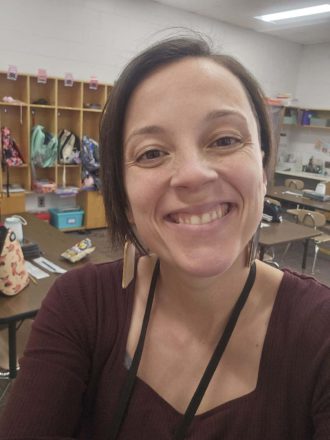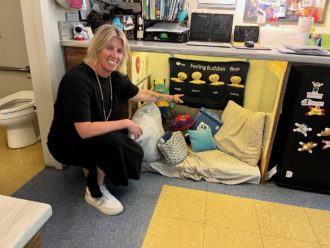Kate Wargo moved to Asheville in fall 2021 with hopes for a fresh start. Teaching elementary school during the COVID-19 pandemic had left her exhausted, anxious and depressed.
“It was the first time I felt dehumanized,” she says of the previous two years teaching fourth grade in Pennsylvania. At first, Wargo taught 30 students remotely. When classes returned to in-person instruction, she had to adjust quickly to teaching half on Google Meet and half in the classroom. Due to unionization rules among the janitorial staff, she wasn’t allowed to sanitize her own classroom. But the janitors weren’t cleaning either — which she realized as she watched a coffee stain remain on her desk for an entire week. When Wargo returned home to her husband and young child at night, emails from her students’ families filled her inbox — about both educational concerns and more personal issues.
“People would say, ‘This is what you signed up for’” as a teacher, Wargo recalls. But she’s adamant that no educator could have predicted the complications of teaching during a pandemic. And despite teachers and other front-line responders being lauded as “heroes” in the nationwide media, Wargo felt like none of her administrators or students’ parents cared about her mental or physical well-being. She says she seriously considered starting on antidepressants or antianxiety medication to help her get through the days.
For a change of pace, Wargo and her family moved to Asheville during Thanksgiving break in 2021. She found a job in the wellness field. But several months later, her daughter’s school had an opening for a second grade teacher. Wargo is passionate about teaching and missed the classroom; she got the job.
She tells Xpress she loved working for Buncombe County Schools — “a night-and-day experience, in many ways,” compared with teaching in Pennsylvania. “The families cared about you as a person … [and it was] the first time I had administrators who looked at me like a person,” she says. Wargo tears up when recalling Superintendent Rob Jackson telling the district’s teachers, “If you ever don’t feel loved, tell me and I will love on you.” BCS’s administrators’ “hearts are in such the right place — that’s why it was hard to leave,” Wargo says.

Yet in the end, she had to. Even with a therapist and a meditation regimen, “my nervous system [was] in shambles for a long time in that career,” Wargo says of teaching. The panic attacks she’d had in Pennsylvania returned in Asheville, both before and after work. She lost her appetite because of the anxiety and dropped weight. She had trouble falling asleep and staying asleep. In February 2024, she didn’t sleep for three nights in a row and had a panic attack in her principal’s office.
Working as an educator today goes beyond classroom instruction, and the additional responsibilities put on teachers can seem overwhelming. Wargo says she worked a nine-10 hour day, including meetings and committees, and she didn’t have guaranteed prep periods each day, as they were sometimes replaced by meetings. She was required to accompany her students in the lunch line, which meant she only had about 15 minutes to eat her own lunch, and she also worked on bus duty in the afternoon. She felt depleted when returning home to her family.
With a diagnosis of post-traumatic stress disorder from her health care providers, Wargo knew it was time to leave her job and focus on her well-being — for herself, her family and her students. Students “deserve somebody who is not burned out,” she says. She left in March. But always an educator, Wargo is now developing her own business teaching creative writing to kids in art galleries.
Unfortunately, Wargo’s stressors and pressures as a teacher are not unusual, several former educators told Xpress. Not even close.
Resilience and support
Licensed clinical social worker and licensed clinical addiction specialist Laura Martin worked in the education field for 20 years, and she saw teachers’ mental health in jeopardy even before the COVID-19 pandemic. Anecdotally, Martin says she witnessed increasing anxiety and panic disorders and widespread burnout. Teachers will “give you the shirts off our backs at the expense of ourselves,” she says.
As vice president of clinical services for Verner Center for Early Learning, Martin is in a position to do something about teacher mental health. The early childhood education center, which serves children ages 0-5, is also home to Verner Center for Resilience, a nonprofit dedicated to fostering educators’ mental health. Supported by a four-year grant from Dogwood Health Trust, the Center for Resilience launched in August. The center began providing teachers confidential individual therapy twice a month for five months, as well as group therapy once a month for 10 months, beginning in October.
Martin provides individual sessions for other early childhood educators in Buncombe County; Verner East in Swannanoa brings in a contracted clinician, who works with the group therapy cohorts and provides individual therapy as well. As the program is grant-funded, it’s free for participants and participating centers. Verner clinical services manager Anja Mayr notes that early childhood educators sometimes do not have health insurance.

Crucially, the therapeutic services take place on-site and on the clock, eliminating travel time. “We really didn’t want another thing they had to do after hours,” Martin explains. The program provides classroom coverage by experienced professionals during therapy sessions, so teachers have one less thing to worry about during their 50 minutes outside the classroom.
Wargo, the former teacher with BCS, tells Xpress that while teaching in Pennsylvania she often felt parents treated her like a babysitter instead of a trained professional educator. Mayr, who was an early childhood educator for infants before she transitioned to clinical services, concurred that educating children, especially young children, often isn’t taken seriously. “You just get to hug babies all day!” she recalls being told. Verner’s resilience program intentionally focuses on early childhood educators, as the profession can be particularly undervalued, explains Martin. (It’s also particularly underpaid — a 2022 study of early childhood education in Western North Carolina financed by Dogwood Health Trust found that teaching staff earn an average of $12 per hour.)
There is increasing “emotional work” involved with children’s education, Martin adds. Eighty percent of students at Verner have had at least one adverse childhood experience (a trauma such as substance abuse, parental separation/divorce or mental illness), or ACE score. Martin says the most common are exposure to opioids or alcohol at birth, multiple foster care placements and having at least one incarcerated parent. And teachers, she notes, also have their own ACE scores impacting their mental health.
The nonprofit is collecting data from teachers who receive therapeutic services. Mayr shared results from one previous group therapy cohort, in which participating teachers described themselves as “overwhelmed,” “anxious” and “frustrated” at the beginning. At the end of sessions, they used words like “validated,” “recharged” and “hopeful.”
Hall Fletcher’s Zen Den
Hall Fletcher Elementary School in West Asheville recently introduced its own contribution to educators’ mental health: a Zen Den.
No, it’s not a break room or a teachers lounge. The Zen Den features a private area for yoga or meditation, a diffuser, soft music, ambient lighting and walls painted a calming sage green. Guests are not allowed to eat meals there, gossip, talk on the phone or listen to audio without headphones, says Hall Fletcher academic coach Erica Engel. All school staff members are welcome, not only educators.
The basement-level Zen Den debuted in late March. It opens before the school day begins and stays open after school. Staff members have settled in to read books, meditate and scribble in mandala coloring books. Sometimes people come there for privacy; Engel says she’s seen staff taking a moment to be alone and cry.
Engel first learned about Zen Dens in education at a training about trauma-informed teaching practices. She thought the concept was “something our school needs, especially [at] a time like now where there’s such a demand on teachers,” she explains. Like other educators interviewed by Xpress, she describes the overload teachers can feel from not only teaching lessons but also helping students address their psychological needs. “Students’ emotional well-being is part of your well-being,” Engel says.

Education is “a profession of empathy and connection,” and teachers are on the front lines of addressing “cascading crises [in society], along with being systemically defunded,” adds Asheville City Schools Foundation Executive Director Copland Rudolph.
Engel spearheaded furnishing a Zen Den with the support of Hall Fletcher Principal Carrie Buchanan, who says she sometimes drops into the room at the end of the school day to decompress before returning home to her family. With Buchanan’s go-ahead, Engel conducted a survey about “compassion fatigue” — that is, emotional exhaustion caused by caring for others — among all Hall Fletcher staff. The results showed burnout was “pretty high,” Engel says. She filed a grant proposal to the Asheville City Schools Foundation, which helped refurbish the Zen Den room (previously a storage room). Chris McMillan from the Asheville store Dwellings donated a sofa and other furniture, while Hall Fletcher’s Parent-Teacher Organization is providing $1,500 for amenities like drinks and snacks.
Rudolph lauded the partnership between the PTO, Asheville City Schools Foundation and a local business in pulling the Zen Den together. But she hopes this calming space at Hall Fletcher isn’t an outlier. “We should have one of these in every school.”
Says Engel, “Our kids need moments to take a breath — and so do adults.”
CORRECTION, May 16, 11 a.m.: This article has been updated to clarify Laura Martin provides therapy services for early childhood educators in Buncombe County.



Parental support when my kids were in public school was shamefully low and it’s even worse now. They should not be breeding, most are too stupid to understand half of what teachers are expected to teach.